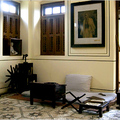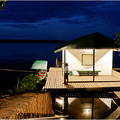
Yannis Kolesidis for The New York Times
POTENTIAL PLAYGROUND An arid region of Crete that is the proposed site of the Cavo Sidero resort development.
ONE of the Mediterranean’s prized stretches of virgin coast lies on the eastern tip of the Greek island of Crete — more than 6,000 acres of land on a craggy peninsula dotted with scrubby bouquets of thyme and sage. If all goes as planned, a group of international investors will turn that land into Cavo Sidero, which is already being promoted as the largest eco-friendly luxury tourism development in southeastern Europe.
On paper, Cavo Sidero looks like the ideal confluence of traditional elegance and environmental respect. A brochure shows watercolors of whitewashed village homes and photographs of starfish, birds and a father and his young son surf fishing. Local environmentalists, however, say water-starved Crete cannot support this $1.6 billion year-round resort, which would include hotels, vacation homes and golf courses.
The debate over the project reflects a concern throughout the Mediterranean, which is now facing drought and scorching heat waves: can a resort built on fragile land be ecologically sound?
“In the Mediterranean, where there’s still a dynamic tourism industry, sustainability is crucial,” said Gabor Vereczi, environmental quality chief in the sustainable development department of the United Nations World Tourism Organization, based in Madrid. “Unfortunately, there are many developments going up in very arid areas. If they want to survive, it’s just good business sense to make sure all environmental safeguards are followed rigorously.”
Indeed, signs of an environmental crisis are everywhere in the region. Parts of Greece, Cyprus, Italy, Portugal, Spain and Turkey are facing desertification, or the degradation of once-fertile soil, because of overbuilding, overgrazing, poor water resource management and an explosion in hothouse agriculture.
Many hoteliers and developers say they have already adopted greener practices. For instance, the Vila Sol Spa and Golf Resort in the Algarve region of Portugal and the Amathus Beach Hotel in Limassol, Cyprus, are touting their water management operations, while the Grecotel chain in Greece is experimenting with water-efficient organic farming in raising food for its hotels. Key Resorts, which operates the Mosa Trajectum resort near the southern city of Murcia in Spain, is promoting “100 percent ecological golfing”; its courses are built on biodegradable foam that is said to reduce water evaporation.
Dolphin Capital Partners, an Athens-based private equity firm specializing in real estate developments in southeast Europe, is working with resorts in Greece, Cyprus and Croatia that will have on-site desalination and wastewater treatment plants and use native plants for landscaping. One Dolphin project, Sitia Bay, is set to go up near the Cavo Sidero site.
“If you are somewhere with water problems, like eastern Crete, you cannot make the area all green, as if you’re recreating Norway,” said Spyros Tzoannos, Dolphin’s asset management director. “You have got to work with the natural environment.”
The Minoan Group, the developers who are planning Cavo Sidero, spent about 2 million euros on an environmental study and also pledged to build desalination and wastewater treatment plants. They say their golf courses will be filled with seashore paspalum, a salt-tolerant grass, and with local flora instead of grasses that require a lot of water. The developers have also partnered with a British-based environmental organization, Forum for the Future, and plan to educate vacationers and homeowners at Cavo Sidero on responsible water use.
“The last thing we want is for people to come here and drive through a desert,” said Christopher Egleton, president of the Minoan Group.
The Greek government strongly supports the project, which includes six villages with traditional homes, villas and apartments as well as hotels, sports facilities, restaurants and shops on about 1 percent of the site. The rest will be set aside for trails, nature areas and three golf courses. When the developers presented their plans earlier this year, the Greek tourism minister, Fani Palli-Petralia, said it would be “one of the greatest projects ever carried out in Greece.”
The Cavo Sidero land belongs to Toplou, a wealthy monastery that owns much of the land in eastern Crete, where it grazes goats and cultivates olives. Philotheos, the monastery’s abbot, has long wanted to invigorate the local economy with more tourism. In 1994, a foundation of which the abbot was a founder agreed to lease the tract, more than 6,000 acres, to the Minoan Group (then called Loyalward Ltd.) for 40 years with an option for 40 more years, in exchange for 10 percent of the gross annual revenue.
But many environmentalists and residents do not want the project. “We don’t want to be in the position of running out of water because it’s being pumped to the tourists there,” said Manolis Tsantakis, an Itanos council member who voted against Cavo Sidero.
Scientists say Greece’s water reserves could dwindle by a quarter by 2030 because of rising temperatures and a decrease in rainfall. The situation is especially sensitive in Crete, which faces chronic droughts and where half of the island is at risk of desertification.
Mr. Tsantakis and other critics of the project would rather see the site used for a public cultural park or not developed at all. They have taken their appeal to Greece’s highest court, which is set to hear the case late this fall.
Mr. Vereczi of the United Nations tourism organization says assessing the ecological viability of luxury developments can be difficult because it’s hard to define exactly what “eco” means in this context.
For many ecotourism devotees, “luxury is the opposite of eco,” said Antonis Petropoulos, director of the Athens-based Ecoclub, an international network of affordable lodges that focus on nature. In Spain, for instance, Ecoclub’s sole member is Mas Lluerna Eco Farm in Catalonia, where visitors live on an organic farm and surrounding wetlands and cook on solar-powered ovens.
Those looking for affordable ecotourism accommodations in the Mediterranean can check with groups such as Sustainable Travel International in Boulder, Colo., and the British-based Responsible Travel, which screen their member hotels for ecological responsibility. The European Union also awards “eco-labels” to accommodations that meet several guidelines, including limiting water usage and waste production. But the eco-label has gone to only a handful of operators, including Sunwing resorts in Greece, Cyprus and Spain.
“Part of the problem is that sustainability is a difficult thing to measure,” said Brian Mullis, president of Sustainable Travel International, which is working with Leading Hotels of the World to draft eco-certification guidelines for that organization’s 440 member hotels. That will take at least a year, said Kristin Glass, marketing director for Leading Hotels of the World.
Meanwhile, the Rome-based Luxury Camps and Lodges of the World offers an international directory of 89 small-scale “eco-luxury” options. Enrico Ducrot, the organization’s president, says he hopes more leisure resort developers in the Mediterranean get serious about sustainability.
“Unless a new model of sustainability is adopted,” Mr. Ducrot said, “it is hard to know who is just talking and who is the real thing.”






